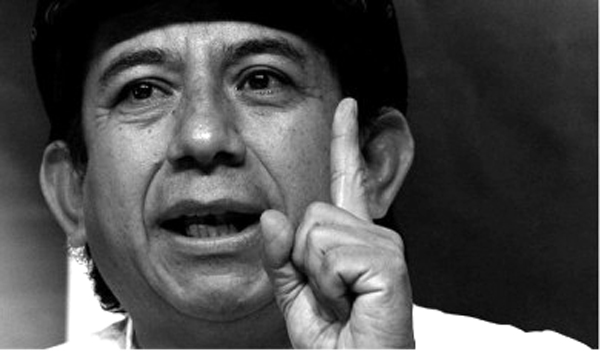Bolivian Labor Leader Discussed Movement Building
June 19, 2013
Oscar Olivera, who lead the victorious movement in 2000 against the corporate privatization of the water system in Cochabamba, Bolivia, addressed a Manhattan luncheon of unionists, students and activists on June 14 at Cornell University’s School of Industrial Relations.
Olivera, the former executive secretary of Bolivia’s Federation of Factory Workers, is recognized throughout the global labor movement as one of its outstanding activists and thinkers. Several books and a feature film, “Even the Rain,” chronicled the movement he led to defeat the Bechtel Corporation’s takeover.
“Our struggle to defend our water system was not just about water,” he contends. It was a struggle about who gets to decide what happens to a country’s common property, such as water, natural gas and oil. It was a struggle about democracy and rights.”
He compared the struggle in Cochabamba to the Arab Spring and current developments in Turkey and other nations. “The struggle is about finding and taking back our voices, so that we can unite against the transnational companies, banks and the powerful.” In recent years, Olivera has written and spoken about the necessity to organize the “precarious workforce,” low-pad, unionized, unprotected workers, the majority of whom are women. A large percentage also are children, Olivera noted.
“The corporations are destroying unions because capital knows that the only force that can oppose its criminal advance is the unity of working men and women.” Olivera called for labor federations throughout the world to incorporate the precarious workers into a revived labor movement. “The only way that yesterday’s trade unionism can survive is to incorporate the new world of work into the old one,” he remarked.
Responding to Olivera’s remarks were two speakers who discussed non-traditional forms of organizing. Byron Silva, business manager of the Laborer’s International Union Local 10, described his union’s training program for non-union day laborers. “We’ve also used our political influence to help pass legislations for these workers,” Silva said. “In 2011 we trained 22,000 workers.”
Victor Salazar of the New York Taxi Workers’ Alliance discussed the challenges of organizing taxi workers. He talked about the large percentage of immigrant drivers from diverse nations. “One thing we did to help build unity,” Salazar said, “was to have groups of workers from one nation or ethnic group hold their meeting in venues such as restaurants of a different immigrant groups.”
“These are the seeds of the new forms of relationships that will grow in the future,” Olivera said.
The forum was chaired by Maria Figueroa, director of the Cornell ILR’s Division of Labor and Industrial Research. Cornell and the New York chapter of the Labor Council for Latin American Advancement sponsored the talk


